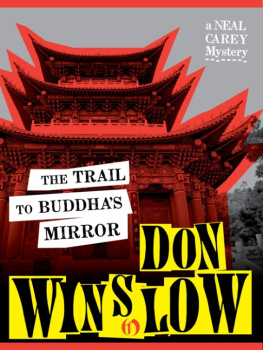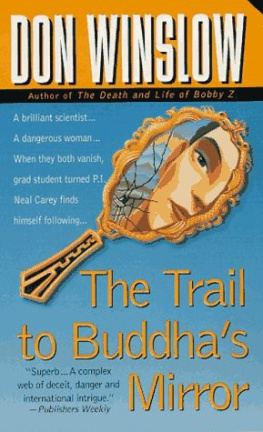
Shibumi, 2011
Copyright 2011 Don Winslow and The Trevanian Beneficiaries
A novel based on Trevanians Shibumi.
Part One: TOKYO, OCTOBER 1951
NICHOLAI HEL WATCHED the maple leaf drop from the branch, flutter in the slight breeze, then fall gently to the ground.
It was beautiful.
Savoring the first glimpse of nature that hed had after three years of solitary confinement in an American prison cell, he breathed in the crisp autumn air, let it fill his lungs, and held it for a few moments before he exhaled.
Haverford mistook it for a sigh.
Glad to be out? the agent asked.
Nicholai didnt respond. The American was as nothing to him, a mere merchant like the rest of his compatriots, peddling espionage instead of automobiles, shaving cream, or Coca-Cola. Nicholai had no intention of engaging in meaningless conversation, never mind allowing this functionary access to his personal thoughts.
Of course he was glad to be out, he thought as he looked back at the bleak gray walls of Sugamo Prison, but why did Westerners feel a need to voice the obvious, or attempt to give expression to the ineffable? It was the nature of a maple leaf to drop in the autumn. I killed General Kishikawa, as close to a father as I ever had, because it was my filial nature and duty to do so. The Americans imprisoned me for it because they could do nothing else, given their nature.
And now they offer me my freedom because they need me.
Nicholai resumed his walk along the pebbled path flanked by the maple trees. A bit surprised that he felt a twinge of anxiety at being outside the closed, small space of his cell, he fought off the wave of dizziness brought on by the open sky. This world was large and empty; he had no one left in it except himself. His own adequate company for three years, he was reentering a world that he no longer knew at the age of twenty-six.
Haverford had anticipated this, having consulted a psychologist on the issues that face prisoners going back into society. The classic Freudian, replete with the stereotypical Viennese accent, had advised Haverford that the subject would have become used to the limitations of his confinement and feel overwhelmed at first by the sheer space suddenly confronting him in the outside world. It would be prudent, the doctor warned, to transfer the man to a small, windowless room with voluntary access to a yard or garden so that he could gradually acclimate himself. Open spaces, or a crowded city with its bustling population and incessant noise, would be likely to upset the subject.
So Haverford had arranged for a small room in a quiet safe house in the Tokyo suburbs. But from what he could learn from what there was to be learned of Nicholai Hel, he couldnt imagine the man being easily overwhelmed or upset. Hel displayed preternatural self-possession, a calm that was almost condescending, confidence that often crossed the line into arrogance. On the surface, Hel appeared to be a perfect blend of his aristocratic Russian mother and his samurai surrogate father, the war criminal Kishikawa, whom he had saved from the shame of a hangmans noose with a single finger-thrust to the trachea.
Despite his blond hair and vibrant green eyes, Haverford thought, Hel is more Asian than Western. He even walks like an Asian his arms crossed behind his back so as to take up as little space as possible and not cause inconvenience to anyone coming from the other direction, his tall, thin frame slightly stooped in modesty. European in appearance, Haverford decided, Asian in substance. Well, it made sense he was raised by his migr mother in Shanghai, and then mentored by Kishikawa when the Japs took the city. After the mother died, Kishikawa moved the boy to Japan to live with and study under a master of the impossibly complicated and nuanced board game Go, a sort of Jap chess, albeit a hundredfold more difficult.
Hel became a master in his own right.
So is it any wonder that Hel thinks like an Asian?
Nicholai sensed the mans thoughts on him. The Americans are incredibly transparent, their thoughts as obvious as stones at the bottom of a clear, still pool. He didnt care what Haverford thought of him one doesnt solicit the opinions of a grocery clerk but it did annoy him. Shifting his attention to the sun on his face, he felt it warm his skin.
What would you like? Haverford asked.
In the sense of what?
Haverford chuckled. Most men emerging from long confinement wanted three things-a drink, a meal, and a woman, not necessarily in that order. But he was not going to indulge Hels arrogance, so he answered, in Japanese, In the sense of what would you like?
Mildly impressed that Haverford spoke Japanese, and interested that he refused to surrender such a small stone on the board, Nicholai responded, I dont suppose that you could organize an acceptable cup of tea.
In fact, Haverford said, Ive arranged a modest cha-kai. I hope you find it acceptable.
A formal tea ceremony, Nicholai thought.
How interesting.
A car waited at the end of the walk. Haverford opened the back door and ushered Nicholai in.
THE CHA-KAI WAS not only acceptable, it was sublime.
Nicholai savored each sip of the cha-noyu as he sat cross-legged on the tatami floor next to the lacquered table. The tea was transcendent, as was the geisha who knelt nearby, discreetly just out of hearing range of the sparse conversation.
To Nicholais shock, the functionary Haverford knew his way around the tea ceremony and served with impeccable courtesy, his ritual flawless. Upon arrival at the teahouse, Haverford had apologized that there were, by necessity, no other guests, then led Nicholai into the machiai, the waiting room, where he introduced Nicholai to an exquisitely lovely geisha.
This is Kamiko-san, Haverford said. She will serve as my hanto today.
Kamiko bowed and handed Nicholai a kimono to put on, then offered him sayu, a cup of the same hot water that would be used to brew the tea. Nicholai took a sip, then, as Haverford excused himself to go prepare the tea, Kamiko took Nicholai outside to the roji, the dew ground, a small garden that held only arrangements of rocks but no flowers. They sat on the stone bench and, without conversation, enjoyed the tranquility.
A few minutes later Haverford, now kimono-clad, walked to a stone basin and ceremonially washed his mouth and hands in the fresh water, then stepped through the middle gate into the roji, where he formally welcomed Nicholai with a bow. In turn, Nicholai purified himself at the tsukubai.
To enter the cha-shitsu, the tearoom, they had to pass through a sliding door that was only three feet high, forcing them to bow, an act that symbolized the divide between the physical world and the spiritual realm of the tearoom.
The cha-shitsu was exquisite, elegant in its simplicity, a perfect expression of shibumi. As tradition demanded, they first walked to an alcove, on the wall of which hung the kakemono, a scroll with painted calligraphy appropriate to the days occasion. In his role as guest, Nicholai admired the skillful brushwork, which depicted the Japanese symbol for satori.
An interesting choice, Nicholai thought. Satori was the Zen Buddhist concept of a sudden awakening, a realization of life as it really is. It came not as a result of meditation or conscious thought, but could arrive in the wisp of a breeze, the crackle of a flame, the falling of a leaf.
Next page














